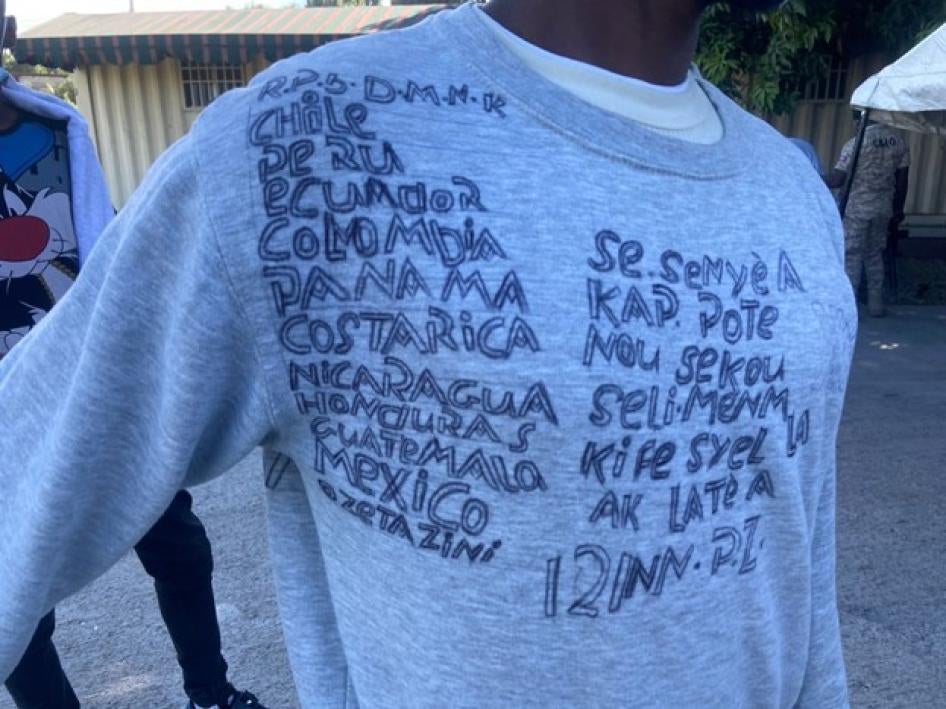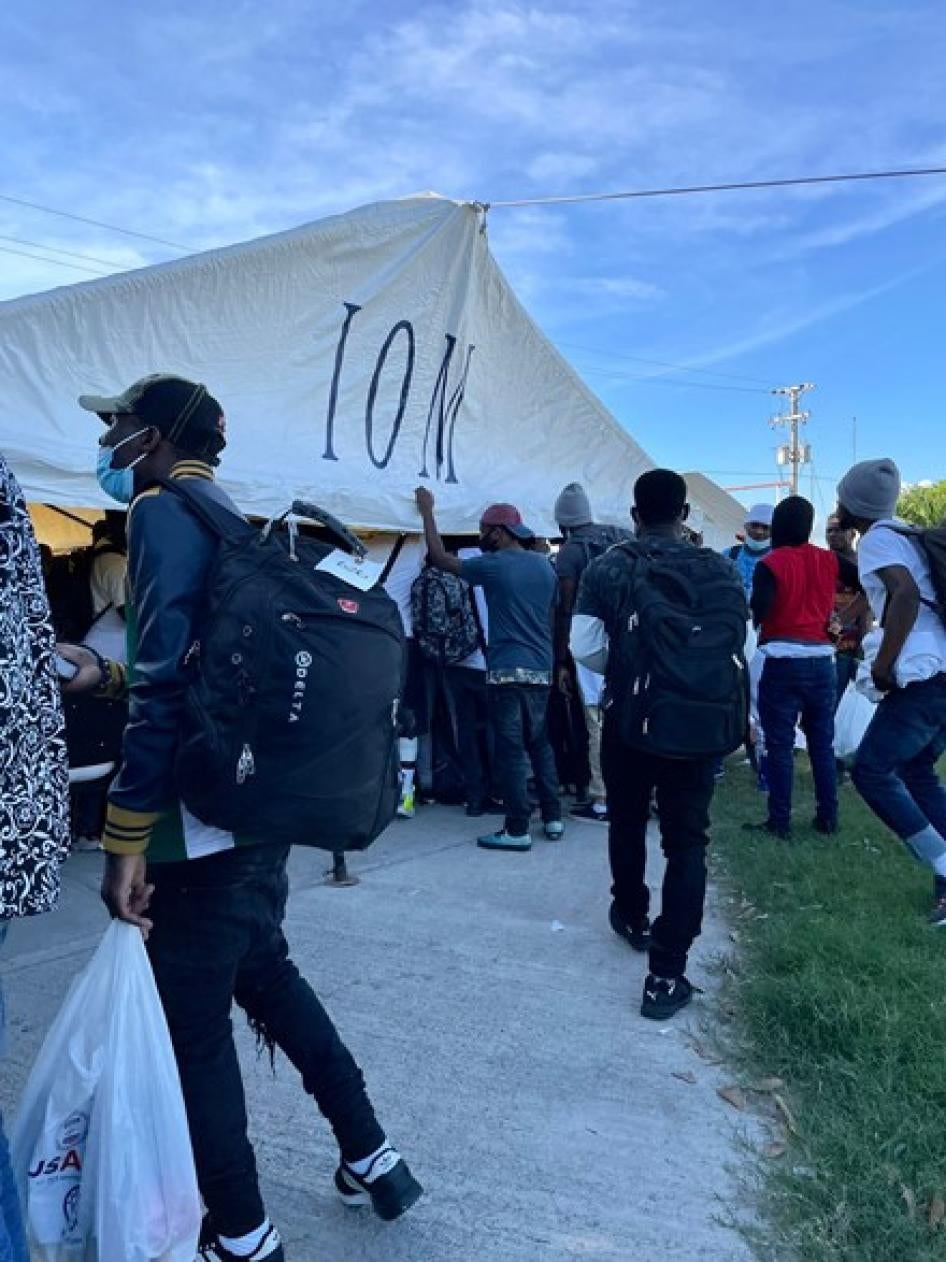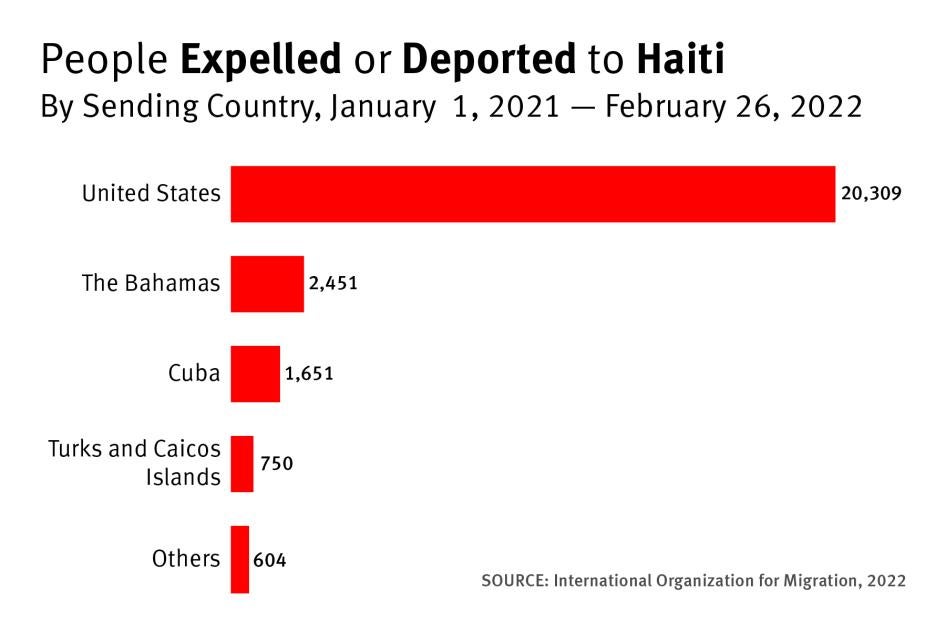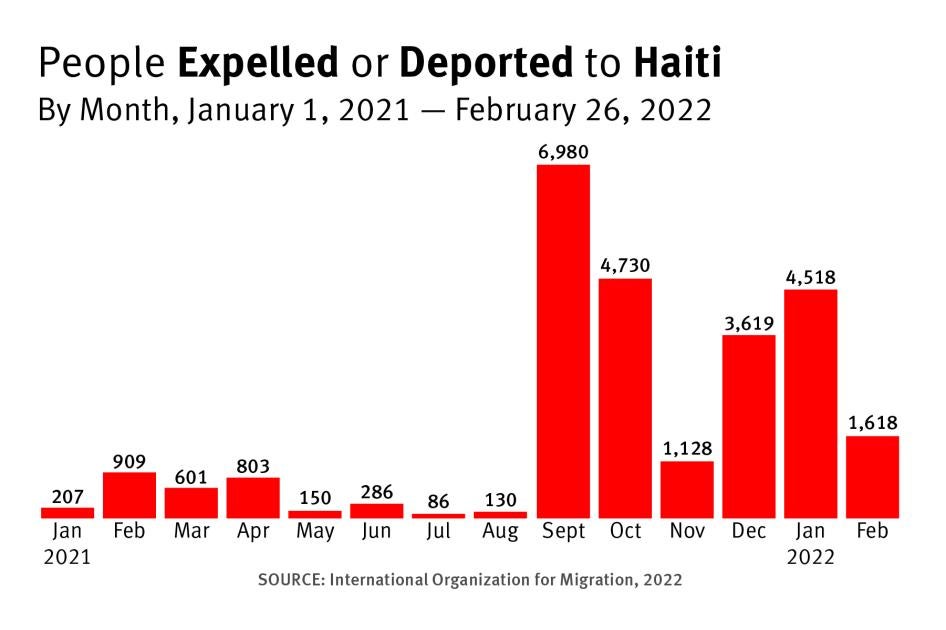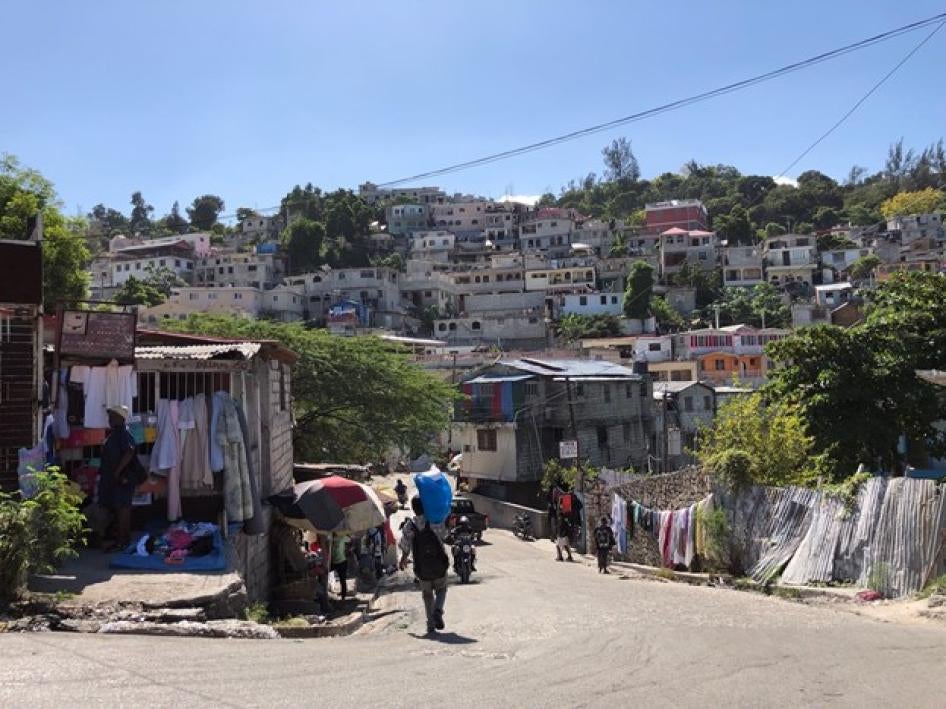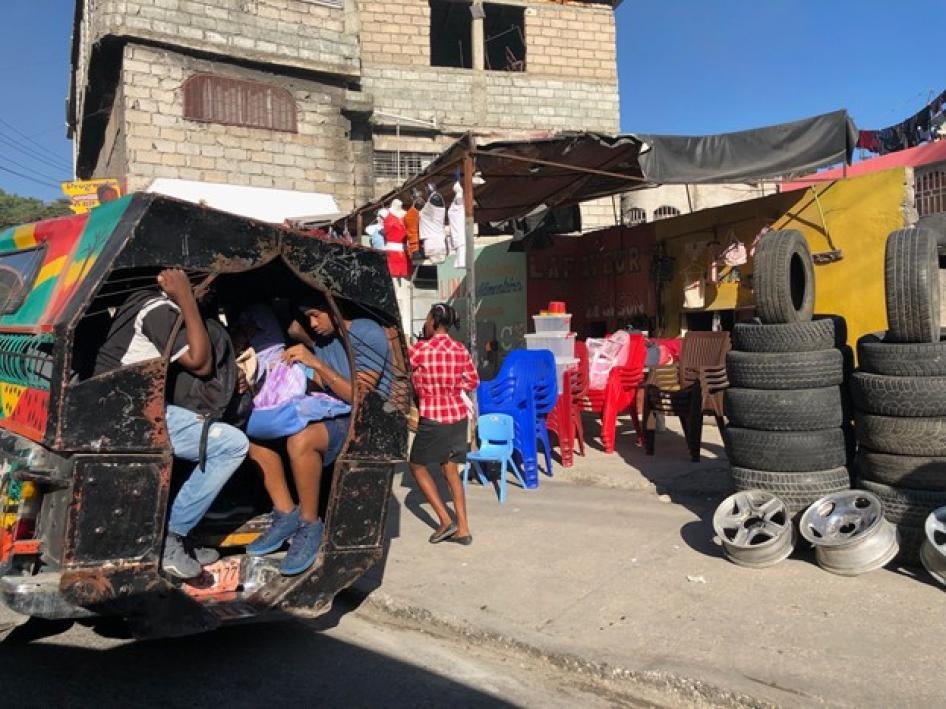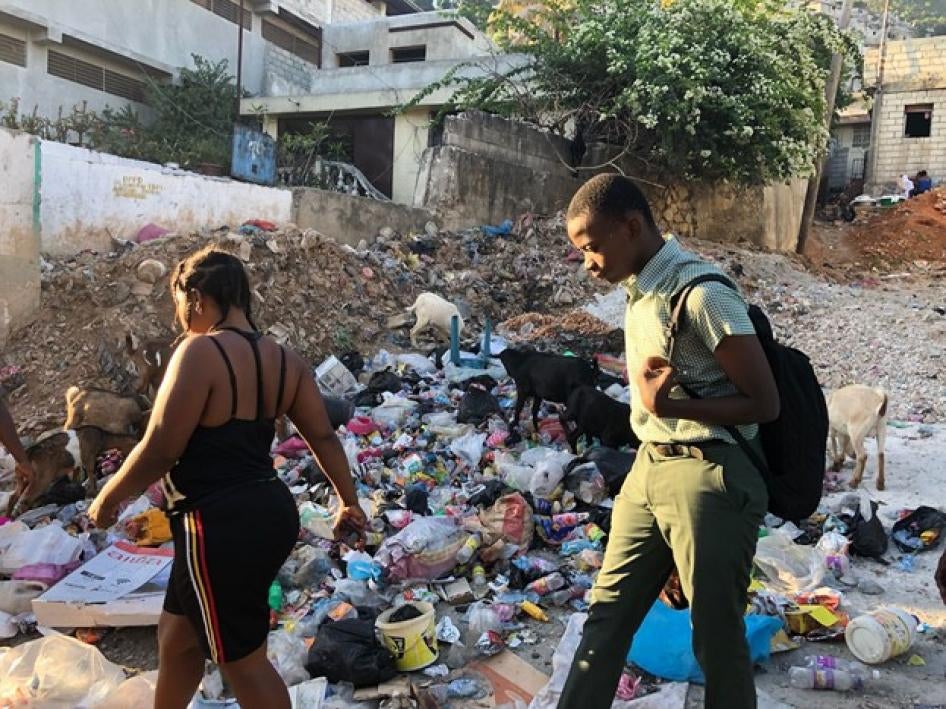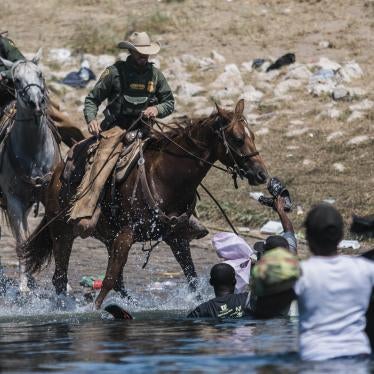(Washington, DC) – The United States and all other countries should stop expelling or deporting people to Haiti, where they face a high risk of violence and have no effective access to protection or justice, Human Rights Watch said today. Haiti is suffering alarming levels of killings and kidnappings by gangs that control strategic areas of the country, in a situation compounded by longstanding impunity for human rights abuses and crime amid a humanitarian crisis.
“It is unconscionable that any government would send people to Haiti while it experiences such a deterioration in security and a heightened risk to everyone’s life and physical integrity,” said César Muñoz, senior Americas researcher at Human Rights Watch. “No government should return people to Haiti. And the United States, which accounts for the vast majority of returns, should end the unnecessary and illegitimate use of a public health regulation for abusive expulsions of Haitians.”
Human Rights Watch interviewed 49 people during a visit to Haiti in December 2021. They included 9 Haitians expelled from the US and the Dominican Republic; representatives of United Nations agencies; civil society members; and Haitian justice and executive branch officials. The officials included Prime Minister Ariel Henry, Justice Minister Berto Dorcé, Interior Minister Liszt Quitel, Ombudsperson Renan Hédouville, and Inspector General of Police Fritz Saint Fort. Human Rights Watch interviewed an additional 16 people remotely before and after the visit, and reviewed data and reports by the UN, civil society, and media.
Returns to Haiti are life-threatening now, and will continue to be so, until security conditions in Haiti improve, Human Rights Watch said. Haiti is experiencing a dire security situation, including loss of government control over strategic areas to the hands of dangerous armed gangs, widely believed to be financed by politicians and to have police officers on their payroll. Violence has worsened an already severe humanitarian crisis.
Haiti is also enduring a deep political and constitutional crisis. Prime Minister Henry, the putative head of government, was not elected but rather appointed by former President Jovenel Moïse, two days before Moïse’s assassination on July 7, 2021. The prime minister governs by decree, without a constitutional mandate. Parliament has ceased to function, and the justice system can barely operate in a context of security and institutional breakdowns.
Impunity for crimes is the norm. “In Haiti, threatened judges have two options: to leave the country or continue with the investigation and have themselves killed for it,” a member of the Superior Council of Justice, the body that manages the justice system, told Human Rights Watch.
Given the security conditions in Haiti, civil society groups and organizations assisting returnees expressed concern that people expelled or deported to Haiti are at risk of kidnapping and extortion by criminal gangs, which may believe returnees have money for travel or relatives abroad who can pay ransoms. However, there is currently no system in place to track and support returnees.
From January 1, 2021 through February 26, 2022, 25,765 people were expelled or deported to Haiti, data collected by the International Organization for Migration (IOM) show. Of those, the US returned 79 percent – 20,309 people – while The Bahamas, Cuba, Turks and Caicos Islands, Mexico, and other countries returned the rest.
From September 19, 2021 – when the IOM started collecting detailed data – through February 14, 2022, the US returned about 2,300 children born abroad to Haitian parents, the majority of them in Chile.
Most people returned by the US had left Haiti years before, escaping an already difficult security and economic situation, and had lived in Chile or Brazil before traveling to the US. Some suffered violence, including sexual abuse, on their way to the US.
The United States should immediately stop its inappropriate use of Title 42, a section of US health law, to expel people to Haiti and elsewhere, Human Rights Watch said. IOM data show that, from September 19 through the end of February, 6 percent of those the US repatriated to Haiti were deported and the rest were expelled under Title 42, which the administration of former President Donald Trump deployed during the Covid-19 pandemic to deny families, children, and adults arriving at the southern border their right to seek asylum in the United States, and which the administration of President Joe Biden has continued to use. On March 11, the US Centers for Disease Control and Prevention (CDC) terminated its authorization of Title 42 expulsion authority with respect to unaccompanied children.
The US has typically not given people returned to Haiti under Title 42 an opportunity to express their fears of persecution or violence or to apply for asylum, in violation of international law.
On March 4, the US Court of Appeals for the District of Columbia Circuit found that “from a public-health perspective, based on the limited record before us, it’s far from clear that the CDC’s order serves any purpose,” in reference to the March 2020 order from the CDC to apply Title 42.
In a decision that could go into effect in April, the court ordered the Biden administration to stop using Title 42 to summarily expel families with children to countries where they would face persecution or torture.
UN agencies and the Biwo Nasyonal Migrasyon (Haitian National Office of Migration) provide some assistance to returnees at the airport, including cash assistance, food, and hygiene products, but they do not monitor their situation after they drop them off at bus stations or hotels, UN officials and Haitian authorities told Human Rights Watch.
A survey conducted by IOM staff among 383 returnees who could be reached by phone in January and February showed that 69 percent of them did not feel safe in Haiti. Of those interviewed, 84 percent wanted to leave the country again because of the economic and security crisis.
In addition to stopping repatriations, foreign governments should work with Haitian authorities, UN agencies, and donors to create a comprehensive returnee reintegration program for those who have already been returned, Human Rights Watch said. The program should address the returnees’ specific needs, including work, security, family reunification, services for survivors of gender-based violence, including access to emergency contraception, and support for children on the basis of best-interest assessments. An IOM representative told Human Rights Watch on March 3 that they have designed a reintegration program and are seeking donor support to put it into operation.
“Haitians and their children, many born abroad, are being returned to a country in chaos,” Muñoz said. “Foreign governments should stop all repatriations and should help set up a reintegration program, in collaboration with Haitian authorities, to monitor the situation of those already returned, help them access basic services, provide assistance to their children, and step in if their lives are at risk.”
For further information on Human Rights Watch findings, see below.
Summary of Human Rights Watch Findings
Countries in the region, most particularly the United States, continue to send thousands of people back to Haiti, including children born abroad, despite the dire conditions in the country. The following sections provide data on expulsions and deportations to Haiti, as well as descriptions of detention conditions in US border facilities. Human Rights Watch also detailed the compounded severe crises that make it unconscionable to send people back to a country that is clearly unsafe. Brutal gangs control and terrorize whole neighborhoods, especially around Port-au-Prince; democratic institutions have collapsed; the justice system is unable to provide justice; and impunity is overwhelming. The security, political, and justice crises have aggravated a severe humanitarian situation.
Detention and Expulsion or Deportation to Haiti
From January 1, 2021 through February 26, 2022, 25,765 people were returned to Haiti by flight or boat, including 4,674 children, according to the IOM. In total, 18 percent of returnees were children, although that proportion increased from 16 percent in 2021 to 25 percent in the first months of 2022.
IOM data also show that from January 2021 through the end of February 2022, 1,142 people were returned by sea: the US Coast Guard intercepted 794 at sea and sent them back, and Cuba sent 348 Haitians back by boat after they had reached its territory, also by boat.
The vast majority have been returned since September 2021, when the US started repatriations to Haiti from Del Rio, Texas.
The US has sent 20,309 people back – amounting to 79 percent of all repatriations – including 5,004 children. The US has not sent unaccompanied children on flights to Haiti, but at least two children on boats were intercepted and sent back by the US Coast Guard, the IOM said. At least another 10 unaccompanied children were returned by Cuba and The Bahamas.
From September 19, 2021 through February 14, 2022, the US sent to Haiti about 2,300 children born abroad to Haitian parents, the IOM said. Of those, about 1,600 were born in Chile; about 580 in Brazil, and about 140 in other countries, including The Bahamas, Argentina, Mexico, and Venezuela.
Most Haitians returned by the US left their country years ago, fleeing violence, the lack of economic opportunities, or the aftermath of a devastating 2010 earthquake, according to the IOM and returnees Human Rights Watch interviewed. Most lived in Chile or Brazil. They said they left those countries because of discrimination, the Covid-19-related economic slowdown, and the difficulty, in Chile, of obtaining legal papers. Knowing of the security and economic crisis in Haiti, they told IOM and Human Rights Watch, they decided to head to the United States, crossing the hemisphere by bus and on foot.
Haitians detained at US border jails – who were later expelled under Title 42 – have reported harsh conditions, including insufficient food, lack of access to showers or hygiene products for weeks, and lack of health care, even for children severely weakened by the trip across the hemisphere, UN agencies and interviewees told Human Rights Watch. IOM personnel in Port-au-Prince told Human Rights Watch they had to treat some arriving children for dehydration.
Some returnees have reported that US border agents took clothing, phones, cash, and their personal documentation, and that they received some but not all of their belongings back upon return to Haiti. One family told Human Rights Watch that a US guard ripped up their personal documents in front of them, including their children’s Chilean birth certificates.
IOM and Human Rights Watch received testimony that couples are separated and held in different US border detention facilities, and not informed of each other’s situation. People expelled from Texas – but not from some other states – were shackled on the plane, returnees and IOM representatives told Human Rights Watch. Haitian officials took off the shackles when the returnees arrived.
US Violations of International and Domestic Law
US and international refugee and human rights law requires the authorities to screen asylum-seekers individually to make sure they do not return people to places where they would be exposed to torture or persecution or where their lives or freedom would be threatened. Human Rights Watch interviewed nine returnees at the Port-au-Prince airport upon arrival, all expelled by the US under Title 42. They all said they had no such screening.
One said he told a guard at the US detention center where he was held that he wanted to request asylum, and the guard replied: “Here, you have no rights.” IOM collected similar testimony, indicating that US authorities did not let Haitians in custody apply for asylum or call a lawyer or the Haitian consulate, according to a summary reviewed by Human Rights Watch.
Some returnees told IOM staff and Human Rights Watch that US officials put them on planes without telling them where they were being taken. They received no warning that they were going to Haiti.
The Biden administration is aware it is sending Haitians to a country that is not safe. In May 2021, the US Department of Homeland Security re-designated Haiti for Temporary Protected Status (TPS) “due to extraordinary and temporary conditions in Haiti that prevent nationals from returning safely.” While TPS only applies as a matter of law to Haitians already in the country at the time of the designation, the underlying logic and rationale behind the designation is based on country conditions in Haiti that prevent any Haitian nationals from returning in safety for the duration of the temporary status. If Haiti is too dangerous to return Haitians who were in the US at the time of the TPS designation, it is equally dangerous for Haitians entering the US after the TPS designation.
A US embassy level 4 travel warning, the most severe, has been in effect for Haiti since August 2021. The warning says: “Do not travel to Haiti due to kidnapping, crime, civil unrest, and Covid-19.”
Several US officials and agencies have expressed strong concerns about US policy on returns to Haiti.
In August 2021, the Department of Homeland Security’s civil rights office warned of the “strong risk” that sending people back to Haiti violated US human rights obligations under domestic and international law because of the danger they faced there. In September 2021, Daniel Foote, US special envoy for Haiti, resigned, denouncing the “inhumane, counterproductive decision to deport thousands of Haitian refugees and illegal immigrants to Haiti.”
Upon leaving his post in October 2021, Harold Koh, who was advising the State Department’s legal office, called the use of Title 42 “inhumane” and “illegal” – a violation of the legal obligation “not to expel or return (‘refouler’) individuals who fear persecution, death, or torture, especially migrants fleeing from Haiti.”
UN agencies have also raised the alarm.
In September 2021, the IOM, the UN Refugee Agency (UNHCR), the United Nations Children’s Fund (UNICEF), and the UN Human Rights Office (OHCHR) said that countries should refrain from expelling Haitians without proper assessment of their individual protection needs, uphold their fundamental human rights, and offer protection mechanisms or legal access to regular migration pathways. UN human rights experts warned, the following month, that “systematic and mass deportations” and “collective expulsions” by the US to Haiti not only violate international law, but “continue a history of racialized exclusion of Black Haitian migrants and refugees at US ports of entry.”
Rampant Gang Violence
The security situation in Haiti has dramatically deteriorated in recent years, as brutal gangs strengthen throughout the country. Gangs control strategic areas of the Port-au-Prince metropolitan area, commonly known as “red zones” or “lawless zones” in Haiti, partially encircling the capital. Control of coastal areas of Port-au-Prince allows gangs to receive weapons by sea, civil society representatives said.
Gangs severely disrupted economic activity throughout Haiti between mid-October and mid-November by blocking the fuel supply from the capital’s port, affecting hospitals, water supply, communications, waste disposal, and humanitarian assistance, health workers and UN representatives told Human Rights Watch. Gangs remain capable of obstructing the country’s main supply routes and fuel terminals “at will,” UN agencies warned in February.
Gangs control the two roads that connect the capital to the Dominican Republic, to the east, and to Haiti’s southern peninsula, jutting westward from Port-au-Prince, which suffered a devastating earthquake in August 2021. They have thus “separated” the four southern provinces from the rest of the country, Justice Minister Berto Dorcé told Human Rights Watch in December.
The approximately 1.1 million people who live in “lawless zones” are at the mercy of the gangs. In disputes with other gangs over control of neighborhoods, armed men have attacked buses and used snipers to shoot indiscriminately at civilians, UN agencies have reported. In some of the “lawless zones,” there is no government presence, UN agencies, nongovernmental groups, and health workers told Human Rights Watch – no schools, no police, and no health services, not even emergency care.
About 19,000 people have fled the violence in such neighborhoods, the IOM told Human Rights Watch, and some are surviving in improvised encampments elsewhere in the city. Some encampments are within unsafe areas, where UN agencies are unable to provide them with assistance, IOM representatives said.
Police reported 1,615 killings and 655 kidnappings in 2021 in the country, but civil society and UN representatives said that many crimes go underreported.
The National Episcopal Justice and Peace Commission, a nongovernmental organization, said that it had documented 659 killings in 2021, in the metropolitan area of Port-au-Prince alone, not including cases in the lawless zones, where they are unable to enter to count.
The Center for Analysis and Research in Human Rights (CARDH), another Haitian nongovernmental group, collected a list of 949 kidnappings in the country in 2021 – counting only cases that appeared in media or were reported to the organization directly. Targets of kidnapping for ransom include not just the wealthy but virtually anyone. Women who are kidnapped are routinely raped, UN and health sector sources said.
Gangs reportedly use sexual violence to terrorize and control neighborhoods, and subject young men to sexual abuse as an initiation ritual, UN agencies said. More than 20 percent of girls and boys in the country have suffered sexual violence, the UN Office of the High Commissioner for Human Rights (OHCHR) reported.
Survivors often fear reporting crimes to the authorities, suspecting links between gangs and police. Haitian Inspector General of Police Fritz Saint Fort, who oversees disciplinary investigations, told Human Rights watch that some officers work as intermediaries between arms traffickers and gangs, while others are informants for gangs. “They are very dangerous. They pass information about police operations to gangs,” he said.
Various officials described links between gangs and politicians. Renan Hédouville, director of Haiti’s Office of Citizen Protection, said, “Gangs can do anything, because they are protected.” Robert Sanders, political counselor for the US embassy in Port-au-Prince, said, “Gangs are funded by politicians for business and political aims.” The OHCHR has said that the Haitian government needs to tackle “the political patronage of armed gangs.”
Collapse of Democratic Institutions
A gradual collapse of democratic institutions has left Haiti without elected leadership. The country does not have a functioning parliament, as former President Moïse refused to organize legislative elections in 2020, when the terms of two-thirds of the 30 senators expired. The 10 senators whose terms have not expired are the only officials now holding national elected positions in Haiti.
Haiti’s Superior Council of the Judiciary ruled on February 6, 2021 that former President Moïse’s term ended that day, after concluding that he had started his term in February 2016, after winning the October 2015 elections. But former President Moïse refused to abide by the decision. He contended that, since voter fraud allegations had led to a second nationwide vote in November 2016, which he had also won, his term had only started in February 2017 and would end on February 7, 2022.
President Moïse was assassinated on July 7, 2021. A few days before, he had appointed Ariel Henry as prime minister.
Prime Minister Henry did not receive parliamentary approval, as the Constitution requires before a nominee can be seated. “We are outside of the Constitution,” Prime Minister Henry told Human Rights Watch in December.
In September, Chief Prosecutor Bedford Claude alleged that Prime Minister Henry had made phone contact with one of the main suspects accused of organizing the assassination of former President Moïse, hours after the killing. Claude asked a judge to approve charges against Prime Minister Henry in connection with the assassination.
Prime Minister Henry, who denies the allegation, fired Claude. A New York Times investigation said the suspect met with Prime Minister Henry twice at the prime minister’s residence after the killing, while the suspect was wanted by police. There has been no judicial decision regarding Claude’s request to approve the indictment of Prime Minister Henry.
Even after what former President Moïse had said would be the end of his own term, Prime Minister Henry – who was appointed by Moïse, not elected – continues to lead the government. No date has yet been set for presidential elections. There is no consensus over who should be a member of the Provisional Electoral Council, the body tasked with organizing elections, and the grave security situation throughout Haiti poses big challenges to holding a vote. It is now unsafe for candidates to campaign in much of the country – and for people to vote. Even senior government officials are being targeted. In January 2022, armed men opened fire on Prime Minister Henry and his entourage as they left the cathedral in Gonaïves, killing one person and injuring two.
Lack of Justice
Haiti’s justice system is barely functioning. President Moïse arbitrarily removed three Supreme Court justices in February 2021 and appointed new justices without following procedures established in the Constitution. Only 5 of 12 justices remained in their roles in January 2022, and they could not rule, because a minimum of 7 judges is needed to decide a case. The terms of two of the five remaining justices lapsed in February.
In Haiti, the president needs to renew the terms of the judges who lead judicial inquiries (juges d’instruction), but former President Moïse failed to keep up with that task. Two-thirds of those judges now have lapsed appointments, a member of the Superior Council of Justice said. They continue to be paid but cannot take official action of any kind.
The security crisis has compounded such problems. Some judges have not gone to their offices in six months for fear of kidnappings and stray bullets, several judicial sources said. “They have literally abandoned their posts, because courts are located in red zones and there is no way to protect them,” a judicial authority said. The road leading to the Palais de Justice, Haiti’s main justice complex – housing several courts – is controlled by gangs, making it impossible to hold hearings there, a representative of the National Association of Haitian Legal Clerks told Human Rights Watch.
The representative said that thieves routinely break into criminal courts in Port-au-Prince to steal case files. Such files are only on paper, he said, without a digital backup. On October 27, 2021, for instance, thieves entered the Palais de Justice and stole the case file of the investigation into the August 2020 assassination of Monferrier Dorval, the head of the Port-au-Prince Bar Association. The thieves also stole the asset declarations of many high-level government officials. All copies of both the case file and the asset declarations were kept in the same safe, justice officials said.
Several judges, clerks, and lawyers have been threatened, UN representatives – as well as clerks and lawyers – said. A member of the Superior Council of Justice said powerful economic interests that employ and finance armed gangs instruct them to threaten justice officials, to block investigations.
Among those who have been threatened are two judges and two clerks investigating the killing of former President Moïse. They received calls telling them to implicate certain people in the assassination or they would themselves be killed, a judicial official said. None have received police protection, justice officials told Human Rights Watch. At least one of the four reported the threats to the chief prosecutor and police in writing in July 2021, but justice officials with knowledge of the case said in December that they were unaware of any action by the police. One of the judges has left the country.
In October 2021, assailants shot at a car belonging to the judge who was in charge of the Moïse case at the time. They broke into the judge’s office and tried, but failed, to open the safe where he kept sensitive documents.
The political and institutional crisis has worsened already rampant impunity.
Since 2018, Haitian civil society organizations have documented the killings of hundreds of people in at least 18 massacres, allegedly committed by gangs, in the Port-au-Prince metropolitan area. The US government has issued sanctions against a police officer-turned-gang leader and two former government officials in connection with the slaughter of 71 people in the La Saline neighborhood in 2018. Nobody has been charged for that massacre, or any of the other 17.
From October 2020 through September 2021 – the last judicial year – only 226 criminal trials were held in the country of 11 million people, the Réseau National de Défense des Droits Humains (National Human Rights Defense Network or RNDDH), a Haitian nongovernmental group, said. In some jurisdictions, courts have not held any hearings on criminal cases for three years, the OHCHR reported.
Meanwhile, 81 percent of the more than 11,000 people in detention are awaiting trial. Some of them have been held for years. Jails and prisons hold more than three times the number of detainees they were built for. A June 2021 UN report said detainees were held in “inhumane” conditions and subjected to ill-treatment and torture.
Corruption continues to mar the justice system, justice officials said. In 2017, former President Moïse obtained legal authority to appoint the head of the Unité Centrale de Renseignements Financiers (Financial Intelligence Unit or UCREF), which is tasked with fighting corruption in the justice system and elsewhere. Representatives of RNDDH and Nou Pap Dòmi, another nongovernmental group, said that the unit’s lack of independence from the executive branch makes it ineffective. Haiti’s national anti-corruption strategy ended in 2019, and the country has failed to adopt a new one.
Dire Humanitarian Situation
The security and political crisis is aggravating a critical humanitarian situation.
On August 14, 2021, a 7.2 magnitude earthquake devastated Haiti’s southwestern peninsula, killing over 2,200 people and affecting over 800,000. It caused damage and losses equivalent to 11 percent of Haiti’s GDP, including damage to or destruction of 59 health facilities and over 137,000 houses. It heavily damaged or destroyed 308 schools, affecting 100,000 children and teachers. Since the earthquake, more than 30,000 people from the southern peninsula remain displaced.
Gangs are making matters worse. Their fuel blockade in October and November disrupted the delivery of assistance, and for almost two months, gang control of the only road from Port-au-Prince made it impossible for UN agencies to send aid to the peninsula by land, the UN Office for the Coordination of Humanitarian Affairs (OCHA) said. Under armed escort, the agencies were able to start sending aid again in early December.
In the country as a whole, nearly 24 percent of the population earns below the extreme poverty level of US$1.23 per day, the OHCHR reported. About 4.4 million people, or nearly 46 percent of the population, face acute food insecurity. Some 217,000 children suffer moderate to severe malnutrition.
“The government does not provide basic services,” Prime Minister Henry said. Under international law, countries are obligated to progressively realize and ensure minimum essential levels of economic and social rights, including the rights to health and food, as well as access to water and sanitation.
The Haitian government has estimated it needs $2 billion to recover from the earthquake. Donors pledged $600 million at a conference in February.
